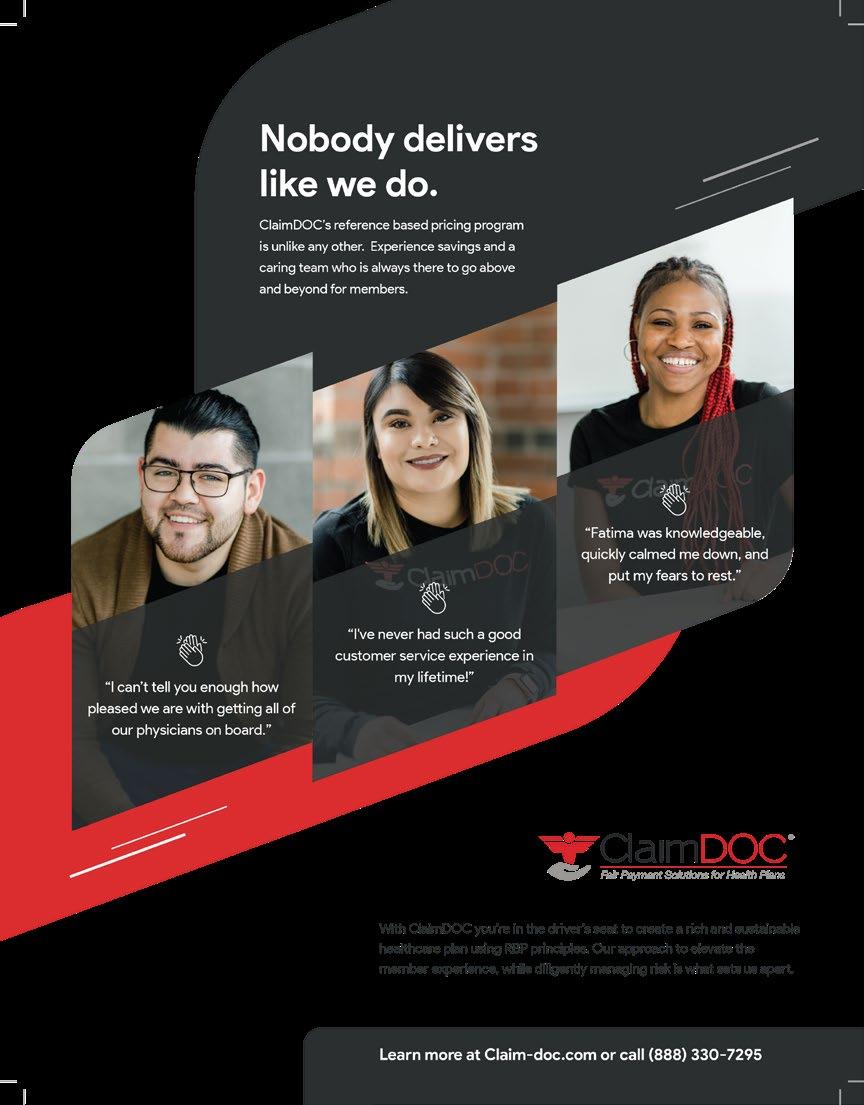
10 minute read
RISE AND SHINE
by SIPC
RISE AND SHINE EMPLOYMENT-BASED HEALTH BENEFITS IN A POST-COVID FUTURE
Written by Ron E. Peck, Executive Vice President and General Counsel The Phia Group, LLC
Advertisement
II t is a summer day in August. The year is 2020. I dropped my son off at daycare this morning. I feel guilt, fear and anxiety over having done so. That is not how I felt upon doing so in August of 2019. What has changed? We are busy enduring
COVID-19; a pandemic the likes of which the United States has not seen in one hundred years.
COVID-19 has caused a ripple effect, felt by almost every facet of our modern society. From retail and food services, to ride sharing and travel. Tourism, education, and of course – health care.
One would reasonably assume that, when discussing a pandemic and health care, the natural direction in which we would head next would be a discussion regarding the health impact – present and future – of COVID-19. The treatment options, the cost of said treatment, as well as short-term and long-term impact of the disease on patients.
Yet, here I will not attempt to dissect the clinical issues presented by coronavirus, and the immediate, direct impact it will have on our health benefit plans, and self-funded plan sponsors. Instead, I will be discussing a threat to our industry not called COVID-19, but rather, a growing sociopolitical threat that has emerged in response to a larger economic victim of the virus.
As retail and restaurants have closed shop – for many, permanently; as businesses have had to suddenly adjust to a “work-from-home” environment – for many, without success; as an economy that was thriving has suddenly been thrust into a recession – so suddenly you would be forgiven for thinking you have whiplash … Employers, and thus employees, have been victims of a pandemic economy.
People have been furloughed or laid off in record numbers. Visit any nation, anywhere on the planet, and involuntarily losing one’s job is never deemed by the ex-employee to be a happy, welcome circumstance. Universally, we work to provide for ourselves a sense of purpose, make a positive impact, and enjoy an income.
Thus, regardless of where you live, losing your job is usually not a cause for celebration. In the United States, Amongst those highly desired benefits, and perhaps primary amongst them, are health benefits. Whether an employer pays premium to a carrier in exchange for traditional, “fully-funded” insurance… or… the employer sets aside contributions from itself and its employees, to “self-fund” its health plan… employees appreciate health benefits.
So much so, it only makes sense that employers realized they could craft, manage, and fund attractive health benefit plans, using them as an incentive – luring in job seekers and keeping existing employees. Indeed, in a capitalistic economy like ours, employers are always hunting for the most effective ways to attract and keep the best talent. In an economy that is functioning well, it only makes sense to allow employers to do so.
What about an economy that is not functioning well? If and when employers are not using health benefits to attract the best talent, because they cannot afford to pay for health benefits – let alone hire said talent in the first place… naturally, those people who were banking on employment as a source for benefits; people who only a few months prior were singing employment based benefits’ praises… will now question the wisdom of such an arrangement. One study 1 suggests that more than five million Americans have lost their health benefits due to being laid off, as a result of COVID-19.


At AmWINS Group Benefits our team of specialists wakes up every morning committed to bringing your team innovative solutions to the opportunities and challenges you and your self-funded clients face. That’s the competitive advantage you get with AmWINS Group Benefits.
One person wrote, “Corporate America fights single payer universal health care afraid to lose power over workers. Insurance companies fight single-payer universal health care because they make money not providing health care. If small business didn’t have to pay for medical, they could raise wages, modernize, expand their businesses and grow our economy. Workers could leave toxic and unsafe working environments or raise their voices when feeling abused without fear of losing their benefits 2 ” and they aren’t alone. There exists a perception that employment-based health plans offer no benefit whatsoever over Medicare, and that – therefore – there is no reason to maintain it. Whenever we, as human beings, make a decision – we perform a cost/benefit analysis. When I wake up in the morning, and decide to brush my teeth, I perform a cost/benefit analysis. I weigh the time it takes to brush against the bad breath and tooth decay I’ll suffer if I fail to brush. If and when we have an interest in another’s cost/benefit analysis, it behooves us to explain to them the benefits and costs involved in that decision. Consider the following example…
When my previous automobile hit 100,000 miles, I began contemplating my next automotive purchase. I am constantly being exposed to manufacturer’s marketing – lauding their cars’ qualities. Thus, when I was shopping around, I was more than armed with the costs and benefits of each option.
Do you choose a stop loss carrier based on price alone?
At Optum, we believe that stop loss is more than a rate on a spreadsheet. We deliver intrinsic value by providing distinctive features, including: • A claims team that verifies billing accuracy with prompt and precise reimbursements • A clinical team dedicated to quality and cost of care • Long-term partnerships that return premiums to employers • Sales, account management and underwriting teams that span nationally, yet are local in focus

Learn more on how Optum can drive value for your customer. Please contact your Optum Sales or Account Management team member.
optum. com ©2020 Optum, Inc. All rights reserved.
Consider the average American voter. Can you confidently say they are aware of the benefits of employment-based health plans? I doubt it! Can you confidently say they are aware of the costs of an alternative? I doubt it!
The bottom line is this – most people believe that providers of health care services charge one amount to all payers.
They believe that different health care providers in the same area charge about the same amount for the same services.
They believe that health insurance – whether it is fully-insured, self-funded, Medicare, or Medicaid – pays the bill in full, and if there is a discount, those savings are for the benefit of the payer, not the patient.
They believe there is no difference between a private plan and Medicare, aside from the means by which they pay for coverage – premiums or taxes.
Rather than continuously allow our industry to be bashed by the media, to be misunderstood by the public, and thus fall short when forced to endure a cost/benefit analysis against Medicare-for-All … all with a backdrop of a pandemic economy … it behooves us to educate the public regarding the benefits of employment based health plans.
Looking at my own employer, and our self-funded health plan; if Medicare-for-All or some other public option were made available at a lower cost to me than my current plan, I would not make the switch. Why? The answer, simply put, is that I understand the benefits of our plan. I recognize that it is customized to match the needs of a population most like me in needs and wants. I recognize that the costs I pay up front are used to enhance benefits I may need later. I recognize that individuals who passionately care about my wellbeing are monitoring my plan and ONLY my plan, to ensure it functions well.
COVID-19 and the unemployment it has triggered armed our adversaries with ammunition. They point at the state of things and argue that health benefits are a human right – and as such – they cannot be tied to something as fickle as employment.
Yet, they fail to address that, whether through premiums or taxes, someone needs to pay for health care. Should we all be covered by Medicare, those unemployed individuals will be called
COMPLEX CLAIMS. FOCUSED RESULTS.
Point6 delivers Financial Savings, Risk Reduction, Growth, Innovation, Value and Efficiency to entities Managing Large
Complex Medical claims and Stop Loss
Insurance for employers.

upon to pay their share, via taxes, using funds they don’t have. As such, passing the buck is not a solution either. The burden is on us to offer a better solution, and to suggest policies meant to contain the cost of the care itself.
Above all else, our job is to remind people of the benefits of private health plans – benefits that Medicare can’t match. We need to change the dialogue – shifting the focus away from unemployment as an excuse to abolish health plans, and instead shift the focus onto reducing the cost of care regardless of who is paying. Ron E. Peck has been a member of The Phia Group’s team since 2006. As an ERISA attorney with The Phia Group, Ron has been an innovative force in the drafting of improved benefit plan provisions, handled complex subrogation and third party recovery disputes, healthcare direct contracting and spearheaded efforts to combat the steadily increasing costs of healthcare.
Considered to be not only one of the nation’s top ERISA lawyers, Attorney Peck is also viewed as one of the nation’s premier self-funded health plan consultants and health benefits attorney; lecturing at and participating in many industry gatherings including but not limited to The National Association of Subrogation Professionals (“NASP”) Litigation Skills Conference, Society of Professional Benefit Administrators (“SPBA”), the Health Care Administrator’s Association (“HCAA”), The Health Plan Alliance, and Self-Insurance Institute of America (“SIIA”). Ron is also frequently called upon to educate plan administrators and stop-loss carriers regarding changing laws and best practices. Ron’s theories regarding benefit plan administration and healthcare have been published in many industry periodicals, and have received much acclaim. Prior to joining The Phia Group, Ron was a member of a major pharmaceutical company’s in-house legal team, a general practitioner’s law office, and served as a judicial clerk. Ron is also currently of-counsel with The Law Offices of Russo & Minchoff.
Attorney Peck obtained his Juris Doctorate from Rutgers University School of Law and earned his Bachelor of Science degree in Policy Analysis and Management from Cornell University. Attorney Peck now serves as The Phia Group’s Executive Vice President and General Counsel, and is also a dedicated member of SIIA’s Government Relations Committee.
References
1 https://www.familiesusa.org/resources/the-covid-19-pandemic-and-resulting-economiccrash-have-caused-the-greatest-health-insurance-losses-in-american-history/ 2 https://www.concordmonitor.com/End-employer-based-health-care-35555925
Stop Loss that does more than stop loss

Looking for an insurance carrier that does more than identify trends? At Voya Employee Benefits, we take the next step, providing in-depth insights into what’s driving costs. Our proprietary data and analytics tools reveal the solutions that help your self-funded clients manage risk better—and protect assets over time.
For Stop Loss insurance that does more, contact your local Voya Employee Benefits sales representative or to download our latest proprietary insights visit voyastoploss.com.
Stop Loss Insurance is underwritten by ReliaStar Life Insurance Company (Minneapolis, MN) and ReliaStar Life Insurance Company of New York (Woodbury, NY). Within the State of New York, only ReliaStar Life Insurance Company of New York is admitted, and its products issued. Both are members of the Voya® family of companies. Voya Employee Benefits is a division of both companies. Product availability and specific provisions may vary by state. ©2020 Voya Services Company. All rights reserved. 1151065 205914 - 05012020









